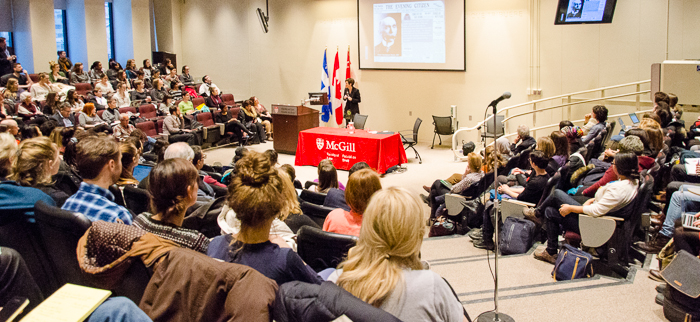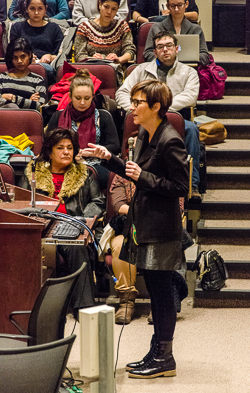
Reconciliation means not having to say sorry twice: Cindy Blackstock on CHRT ruling
By Jeanelle Dundas, 3L
On February 17, McGill’s Faculty of Law, in partnership with the School of Social Work and the Centre for Research on Children and Families, welcomed Dr. Cindy Blackstock, Executive Director of the First Nations Child and Family Caring Society of Canada, to deliver the Annie MacDonald Langstaff – Margot E. Halpenny Lecture.
 Dr. Blackstock spoke candidly about her almost decade-long battle with the Department of Justice to secure adequate funding for child welfare services for First Nations children living on reserve. It was an animated and captivating speech for an audience that included students of law, social work and medicine, as well as lawyers and professors, and, most importantly, survivors of the residential schools system and, arguably one of its successors, the child welfare system.
Dr. Blackstock spoke candidly about her almost decade-long battle with the Department of Justice to secure adequate funding for child welfare services for First Nations children living on reserve. It was an animated and captivating speech for an audience that included students of law, social work and medicine, as well as lawyers and professors, and, most importantly, survivors of the residential schools system and, arguably one of its successors, the child welfare system.
In 2007, the First Nations Child and Family Caring Society and the Assembly of First Nations filed a human rights complaint against the federal government, alleging that Canada’s failure to provide equitable and culturally based child welfare services to First Nations children on-reserve amounts to discrimination on the basis of race and ethnic origin. On January 26th, The Canadian Human Rights Commission released a decision in First Nations Child and Family Caring Society et al. v. Attorney General of Canada. The Tribunal held that the federal government discriminated against First Nations children by failing to adequately fund on-reserve child welfare services.
In describing her experience, both financially and emotionally gruelling, Dr. Blackstock maintained that she always knew that justice would prevail. She recounted the ordeal as an extreme example of a lack of common sense on the part of the government. In other words, instead of finding a way to dismantle its policies that were admittedly racially discriminatory towards First Nations children, she emphasized how Aboriginal Affairs and Northern Development Canada (now Indigenous and Northern Affairs Canada) spent millions of dollars to prevent the case from being heard at all, in addition to the resources spent to place her under surveillance in a misguided attempt to discredit her claim. These were dollars, she noted, that could have been spent helping some 163,000 children in the child welfare system, children who had collectively spent 66 million nights, or 187,000 years of childhood away from their families between 1989 and 2012.
In a poignant move emphasizing her commitment to First Nations children in Canada, upon the Tribunal’s finding that a government official had retaliated against her in 2009, Dr. Blackstock donated the $20,000 she received in damages for pain and suffering to children’s charities. This was particularly moving as she told of a child who said to her: “Discrimination is when the government doesn’t think you’re worth the money.” Sadly, the tale recounted over the course of the evening was one of a government spending money in all the wrong places: whether it was to prevent cases such as this one from seeing the light of day, or to engage in jurisdictional disputes leading to the unnecessary suffering of children in dire need of services, the government’s only strategy when it came to First Nations children seemed to be to one of refusing to address the systematic oppression of Aboriginal peoples in Canada, effectively barring any hope for meaningful steps towards reconciliation.
Towards the end of the evening, Alanis Obomsawin, OC, a Canadian filmmaker of Abenaki descent, spoke of her forthcoming documentary on the case and about how, for the first time in a long time, the Tribunal’s ruling and Dr. Blackstock’s tireless efforts have given her a sense of hope for the future of Aboriginal people in Canada. It was a fitting finale for an inspiring night: Dr. Blackstock reminded attendees, particularly law students, to pursue their passions and to go about their day-to-day work, but to do so with a heightened sense of justice, a little more compassion and, indeed, a lot more common sense.
